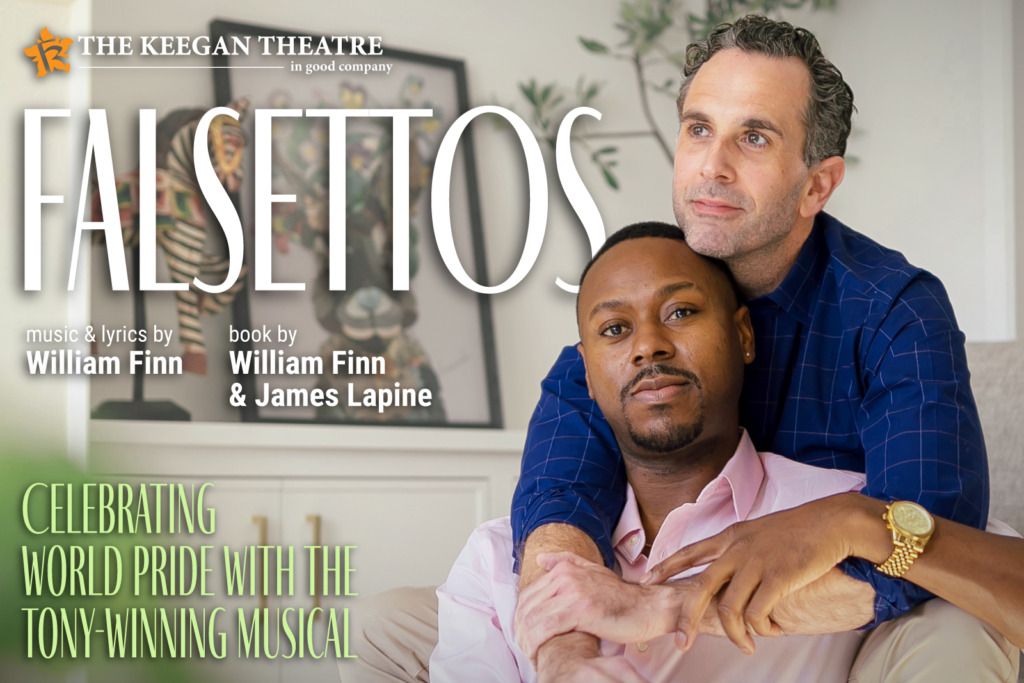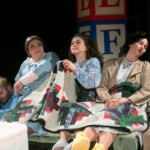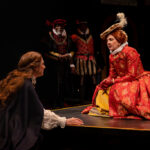author: Steven Kirkpatrick & Charles Boyington
Running at the Keegan Theatre from May 10 to June 15, Falsettos is a clever, emotionally resonant musical whose themes center on Jewish family and gay life in the late 1970s and early 1980s. At its center is the conflicted Marvin (John Loughney), a gay man who introduces us in an early sequence to his lover, Whizzer (Kaylen Morgan), and his ex-wife, Trina (Katie McManus), along with Marvin and Trina’s precociously smart son, the 10-year-old Jason (Nico Cabrera). Oh, and, of course, their family therapist, Mendel (Ryan Burke).

First premiering on Broadway in 1992, Falsettos is a sung-through musical (in which all dialogue is sung) with a book by William Finn and James Lapine, and music and lyrics by Finn. The first act, set in 1979, explores the impact Marvin’s relationship with Whizzer has had on his wife and son. The second act, set three years later, explores the extended family dynamics that evolve as he and his ex-wife plan his son’s bar mitzvah, which is complicated as Whizzer is diagnosed with early case of AIDS. The biggest fret for any revival is whether the show may seem dated or merely a period piece, yet as the recent Tony-winning revival proved, Falsettos still has enough vitality to seem fresh and deeply relevant.
One reason is Finn’s ingenious sung-through score: consistently a joy, it showcases his ability to turn complicated but natural conversation and intricate interior thought into song. Words and music are richly entwined, from the tongue-in-cheek complaints of “Four Jews in a Room Bitching,” to the clever wordplay of “The Baseball Game” (during which the cast sings: “We’re watching Jewish boys who cannot play baseball– play baseball.”) Like the best of Sondheim, the lyrics make you constantly marvel at Finn’s ability to combine humor, complex phrasing and searing tenderness.
Yet the greater part of the show’s durability is the generosity and affection with which the writers approach every one of their imperfect characters. One of the surprises is that while Marvin is clearly meant to be the lead, it’s his wife Trina who emerges as the moral center (and perhaps the best role) in Falsettos, her fondness for the man-babies in her life battling with exasperation and needy resentment at every turn. Katie McManus throws herself into the role with force and abandon: her big number, “I’m Breaking Down,” delivered while preparing a banana and carrot surprise, is one of the funniest musical songs in recent Broadway history. And in “Holding to the Ground,” she sings with melancholy honesty of trying to stay true to a life in which the rules keep changing on her.
Nico Cabrera as young Jason manages to hold his own with the adult performers and seems to hit every emotional note needed. Ryan Burke’s Mendel may suggest a neurotic Jewish therapist only marginally less messed-up than his patients, but Burke also adds a giddy, appealing energy to his portrayal of a loving man who must convince himself of his right to be happy. In fact, in Keegan’s production, the characterization and performances of these three in Act One may overshadow the story of Marvin and Whizzer.
This is not the fault of John Loughley and Kaylen Morgan; it’s also in the writing. In the first act, in particular, Marvin comes across as a self-centered jerk. That’s not because he embraces his sexuality and exits his marriage, while still wanting to keep his wife and son close in a “tight-knit family,” but because he reacts with irrational jealousy when Trina attempts to rebuild her own happiness in a new relationship with Marvin’s therapist Mendel. Marvin’s behavior toward Whizzer is also questionable. He understandably balks at his handsome, younger mate’s disdain for monogamy, but is obnoxious when he asserts that being the breadwinner gives him the right to confine Whizzer to the pretty-boy homemaker role.
Yet by Act Two, Marvin has matured, he and Whizzer have reunited, and the family has expanded to include the lesbians next door: Dr. Charlotte (Shayla Lowe), who puzzles over Whizzer’s decline, and her girlfriend, the “shiksa caterer” Cordelia (Kyle Claire Truby). Both Lowe and Truby are both warm and effective, and the actors have a greater opportunity to shine: John Loughney delivers “What More Can I Say?’ with sensitivity and aplomb, and Kaylen Morgan creates a believably nuanced Whizzer. His connection with Jason in their scenes together seems real, as are the courage, the defiant dignity and the acceptance of his heartbreaking song, “You Gotta Die Sometime.”
Overall, the Keegan Theatre has mounted an adroit performance of a musical that should be produced more often. The entire cast have great voices and can sell songs with gusto. They are also extremely talented actors who can make the most of a moment. It is not an easy task in the fast-paced show that begs you to listen closely and use your imagination. The first act might be a little overwritten, lacking in subtlety and even a bit overwhelming. Act II is so warm and lovely and filled with wondrous moments that you will be quick to forget any misgivings you had during the first act.
Music Director Elisa Rosman keeps the action moving and the music on point. If there was any flaw in the music, it was that the audience wanted more time to applaud. (And, yes, there was a technical issue or two on opening night, but nobody let it bother them.)
Director and Choreographer Kurt Boehm made some bold choices in how to present the show, which generally worked. The show is intended to involve as much story telling as showing us the action. With a unit set designed by Matthew J. Keenan, there are no grand scene changes or large pieces of furniture to move so it is up to the lyrics and the actors to let us know where and when we are. The best part of the set was the stunning New York 3D skyline done in all white that was then lit to enhance the mood of each scene. Very effective. The lighting by Lynn Joslin was inspired at times. Lighting what is basically an all-white set is a challenge but it was handled beautifully. The costuming by Paris Francesca helped to define the time and the passage of time as well. It was a delight to watch the continuing parade of fashions from the late 70’s and early 80’s!
Running Time: 2 hours and 10 minutes with one intermission
Falsettos plays through June 15th 2025 at The Keegan Theatre— 1742 Church St. NW in the Dupont Circle neighborhood of Washington, DC. Tickets are available by calling the box office at 202-265-3767 or by purchasing them in advance online.





